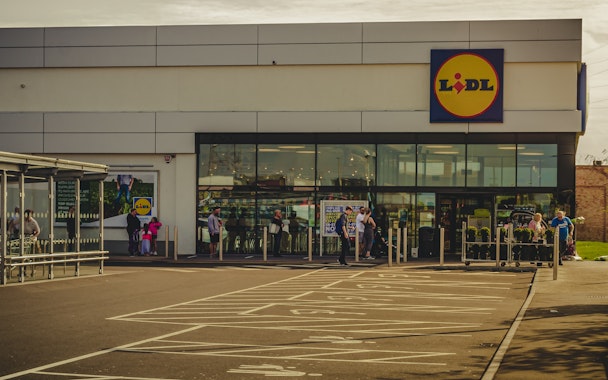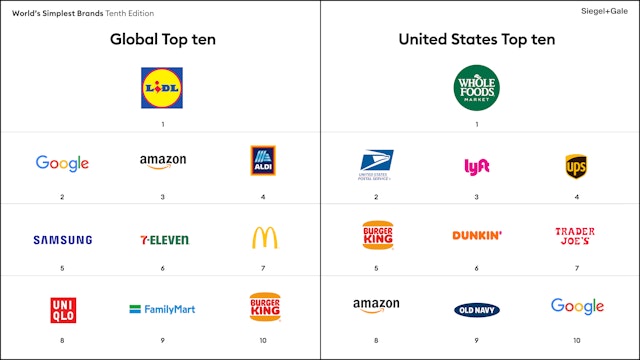How Lidl became the world’s simplest brand
Agency Siegel+Gale has recently published its index of the world’s simplest brands. Philip Davies looks at what got Lidl to the top spot.

Lidl: the world's simplest brand? / K. Mitch Hodge via Unsplash
From where they shop to the way they communicate, people put a premium on experiences that are easy to understand, transparent and honest; that care for and meet their needs; and that are innovative, fresh, and useful.
In short, we like to keep things simple.
According to our research, 64% of people are willing to pay more for simpler brand experiences, and 78% of people are more likely to recommend a brand for its simpler experiences and communications. On the other side of the equation, brand complexity costs. In fact, it can result in $780bn of total annual unrealized revenue among global brands.
At Siegel+Gale, we were proud to recently launch our World’s Simplest Brands Tenth Edition (WSBX), where we asked more than 15,000 people across nine countries which brands and industries provide the simplest experience – then we ranked them.

This year German supermarket giant, Lidl, has emerged victorious in taking our coveted global top spot, beating the likes of Aldi and other food retailers (although I know many advocates for ‘Kevin the Carrot’ might disagree with these results).
Advertisement
So why is Lidl the simplest brand?
With 12,000 stores worldwide, Lidl has been highlighted by Kantar as the UK’s fastest-growing supermarket and by the Ethical Commerce Society today as the UK's most trustworthy supermarket. High praise indeed. But what is the linking factor behind its success?
Answer: a series of simple brand-led decisions to ensure the chaos of shopping is seamless, not a chore.
Simple decision #1: Avoid range overload
In this consumerist society, an abundance of choice is available to us at the drop of a hat. Does this help with our stress levels? Most certainly not. While the luxury of choice is a privilege (and perhaps a desire) for consumers, overloading shelves with duplicate brands leads to confusion.
By keeping ranges simple and using the space in-store sensibly, Lidl helps its customers to shop efficiently and exit with ease, making their lives simpler in the process.
Advertisement
Simple decision #2: Keep prices competitive
As shopping receipts become an ever-imposing eye-sore, Lidl’s affordable prices provide welcome relief. As mentioned, the avoidance of range overload allows customers to make quicker, more efficient choices, and to save money by reducing impulse purchases.
With Lidl’s emphasis on private label or store brand products, shoppers can save money while still getting bang for their buck – such quality comes from a smart operating model that actively optimizes processes to minimize waste and reduce operational costs. Lidl can keep its prices competitive by integrating simplicity into stores, avoiding elaborate décor and excessive staffing. Instead, Lidl passes these savings on to its customers, prioritizing their needs.
Simple decision #3: Clear and honest communication
Honesty and clarity in brand communication are key. Brands can simplify their messaging by avoiding jargon, keeping promises, and providing straightforward information about products, pricing, and policies. People will find themselves repeating Lidl’s renowned tagline – ‘Big on quality, Lidl on price’ – used ubiquitously across their ads. It’s a promise the brand makes to its customers, and its competitive prices show that the proof is in the strudel.
Get the right words, and it’s incredibly useful. It shows the power of simplicity, conveying an idea in one phrase that positively represents a ‘brand’ in shorthand and enters people’s minds at speed, and due to its incredible economy, stays there for longer, often to positive effect.
This is all supported by the brand’s simple primary colors: red, yellow, and blue. This simplicity has paid dividends, helping the supermarket to increase its market share by two-thirds over the time that it’s had that famous slogan – evidence that simplicity truly does pay.
Suggested newsletters for you
Simple decision #4: Focus on the customer
Lidl keeps the customer central to its brand decisions and is inclusive for all. Importantly, the brand does this authentically. From in-store experiences to weekly promotions, everything comes back to care for the customer to ensure a simple, hassle-free shopping experience. Small details like printing its barcodes twice on most of its products make check-out more efficient help those with limited dexterity or deteriorating eyesight.
Furthermore, Lidl delivers on promises and increases customer trust in its brand. By being transparent, straightforward, and consistent in its messaging, the brand builds authenticity. Often, complexity is a mask to hide a true identity. Brands may complicate their language or actions to appear more sophisticated or to obfuscate reality. In contrast, authenticity often involves stripping away these complexities to reveal an unfiltered version.
Simple decision #5: Leverage the customer
Lidl's success in becoming the Simplest Brand hinges on its ability to harness the power of its customer base, recognizing that its customers are not just consumers but potential brand advocates. Satisfied customers who have had a positive shopping experience are more likely to recommend Lidl to their friends and family. By fostering a sense of loyalty and trust, the brand therefore turns its customers into genuine ambassadors who promote the brand organically.
Since 2009, the publicly traded simplest brands consistently outperform the average global stock index by 1,600%. While consumer preferences have evolved over time, in the wake of the Covid-19 pandemic, individuals now prioritize brands that deliver simplicity. By offering transparent, honest, and innovative experiences that meet the needs of its diverse customer base, Lidl continues to showcase the power and appeal of simplicity in the modern business landscape.
It's one to watch.
Content by The Drum Network member:

Siegel+Gale
Siegel+Gale is a global branding company headquartered in NYC. Our core expertise spans brand development, brand strategy, design, and customer experience.
Find out more
